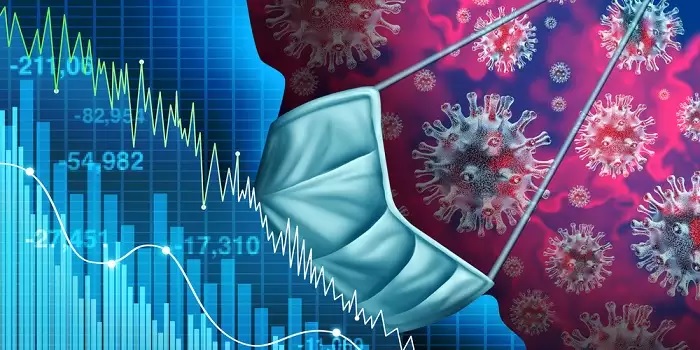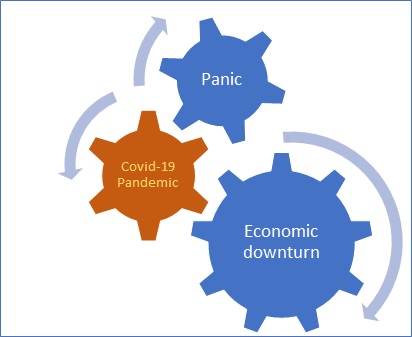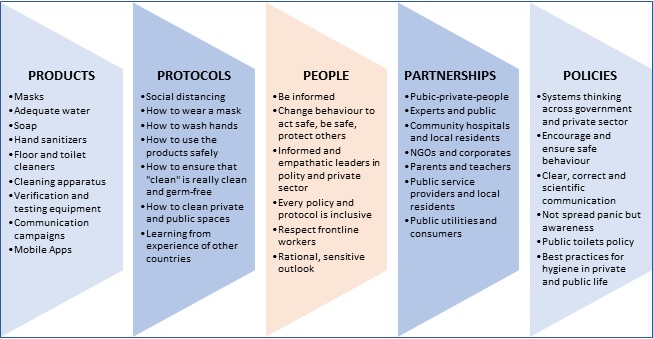Background
Our wellbeing, social relations and economic growth have been greatly impacted by the Covid-19 pandemic. Officially, the first Covid-positive case was declared in Kerala on January 30, 2020. Since then, India has been in multiple phases of lockdown and “Unlocking” since March 24, 2020. Every segment of society and the productive sectors have been impacted, some more and some less.
The Indian economy is predicted to contract by 4.5% in 2020-21[1]; the world faces a 5.2% contraction in global GDP in 2020[2]. The pandemic brings a double whammy. Many more are likely to be the “new poor”[3] due to constraints in economic opportunity. It is imperative that not only do we work towards achieving our potential but go beyond it to make up for the losses we have faced due to the pandemic. Further, the government and the private sector need to work together to bolster the healthcare facilities – primary, secondary and tertiary – in both rural and urban areas.
The Negative Factors
Inadvertently and unfortunately, among significant parts of the Indian populace, the communication and messages by healthcare bodies on Covid-19 have resulted in: (i) fear instead of caution and concern; (ii) self-centered approaches rather than empathy and inclusivity in social relations; and (iii) panic and irrational behavior as opposed to science-based, cooperative and productive actions. Moreover, abundance of misinformation and rumors on social media add to the difficulties.
The two factors or negative P’s are (Figure 1): Pandemic and Panic. Covid-19 has impacted us largely not only due to it being an illness but also by the panic created among the people. Anecdotal evidence and news suggest highly irrational and anti-social behavior among people. A doctor, who lost his life, was not allowed to be cremated by the local community in Chennai[4]; events of ostracization of airline crew, those returning from abroad, and maids who visit an apartment complex where any person has tested positive for Covid-19[5]; and frontline healthcare workers have been attacked[6] and socially boycotted.
Figure 1: Pandemic and panic have led to a sharp economic downturn
Small roadside eateries face the difficulties of opening up; service providers such as maids and drivers have been shunted out of jobs; and migrant workers were shunned as parochial instincts overcame reason. Such behavior arises from a lack of complete and correct information, putting fear ahead of caution, and equating socio-economic classes with level of hygiene. Many people are still unsure if their hands are really clean despite applying a hand-sanitizer. Confusion prevails whether wearing a mask protects oneself or others, if one is Covid-positive. Or does a mask protect anyone at all? Should I use a public toilet or a shared toilet in an office space? How clean is really clean? Does cleaning actually disinfect and protect from a potential source of infection? Such questions and doubts abound.
Hygiene and Economic Recovery
In midst of the challenges the government of the day needs to plan for a recovery process that is inclusive; meaning it includes not only formal (large, medium, small and micro enterprises) but also informal enterprises such as headload sellers, roadside eateries, vendors on pavements, small shops and kiosks, and carts selling food or items of daily use. It has to be resilient, protecting viability of businesses even if Covid-positive cases rise, which they seem to in the near future.
The notion of “social distancing” has been well understood (though often not acted upon), especially as enunciated[7] by the Prime Minister of India as “Do Gaj Doori” or urging people to keep a distance of two yards or six feet from each other. However, the concept of hygiene is not only complex but also multidimensional. To shield the country from further disruption at workplace, educational institutions[8], marketplaces and households, and get working towards a sure and sustainable economic recovery, it could focus on the following positive framework (Figure 2) of five P’s: Products, Protocols, People, Partnerships and Policies.
Figure 2: Inclusive and sustainable framework on “Hygiene and Economic Recovery”
The People lie at the heart of this framework; for they have to use the Products, follow the Protocols, and leverage the Partnerships and Policies. It is hoped that the following outcomes will be achieved:
- Well-designed and inclusive policy architecture promoting scientific, rational and safe behavior
- Robust multi-stakeholder partnerships promoting and ensuring inclusive and resilient economic recovery
- Well-informed, empathetic and rationally acting populace
- Greater understanding on “how to clean” and “verify cleanliness”
- Correct usage of hygiene products such as masks and hand-sanitizers, while following correct procedure of handwashing and keeping all toilets clean
- Urgency among government to provide adequate water and low-cost access to soap to the poor and underprivileged communities
- Greater confidence among people to use products and services of micro-entrepreneurs (including informal sector), migrants and informal workers
- Safe reopening[9] of educational institutions
- Hygiene will be an enabler for economic recovery providing safety, confidence and lower number of Covid-positive cases
References:
[1]Monthly Economic Report June 2020. Department of Economic Affairs, Government of India. Page 29
[2]World Bank. 2020. Global Economic Prospects, June 2020. Washington, DC: World Bank. DOI: 10.1596/978-1-4648-1553-9. License: Creative Commons Attribution CC BY 3.0 IGO; pages 97 and 3 respectively.
[3]https://blogs.worldbank.org/voices/covid-19-will-hit-poor-hardest-heres-what-we-can-do-about-it
[4]https://www.thehindu.com/news/cities/chennai/local-residents-protest-cremation-of-doctors-body-in-chennai/article31331307.ece
[5]https://thewire.in/society/coronavirus-rwa-residential-colony-stigma
[6]https://www.bbc.com/news/world-asia-india-52151141
[7]https://www.indiatoday.in/india/story/mann-ki-baat-coronavirus-pm-narendra-modi-covid-19-social-distancing-1671228-2020-04-26
[8]https://theprint.in/india/education/in-india-over-32-crore-students-hit-by-covid-19-as-schools-and-colleges-are-shut-unesco/402889/
[9]https://www.unicef.org/sites/default/files/2020-04/Framework-for-reopening-schools-2020.pdf
(The Author is Independent Consultant; Water, Sanitation and Climate Change.The Views expressed are personal.)
Image Source: https://etimg.etb2bimg.com
(The views expressed are the author's own and do not necessarily reflect the position of the organisation)



